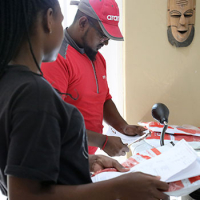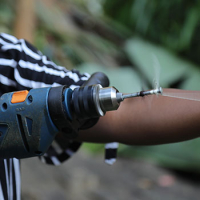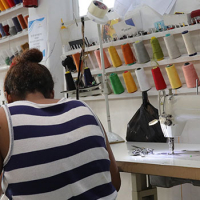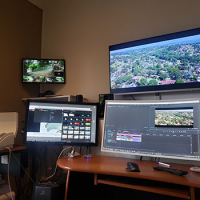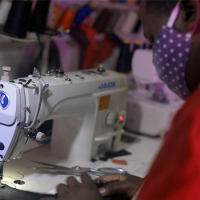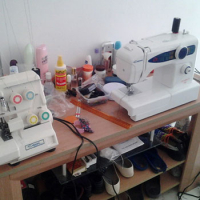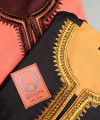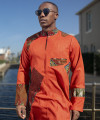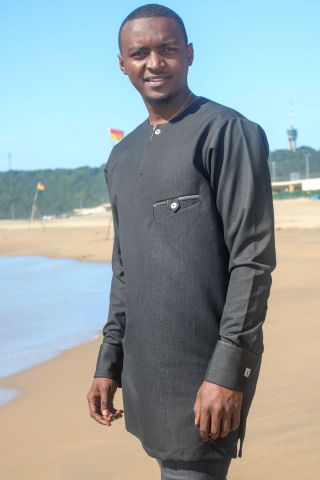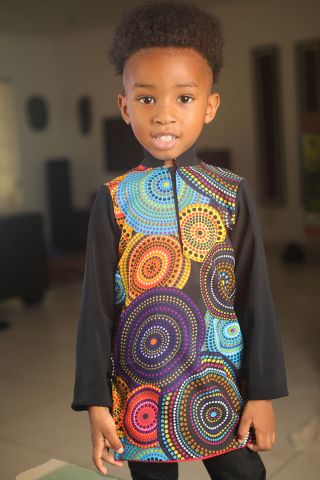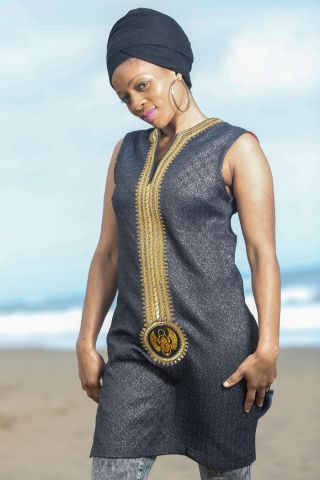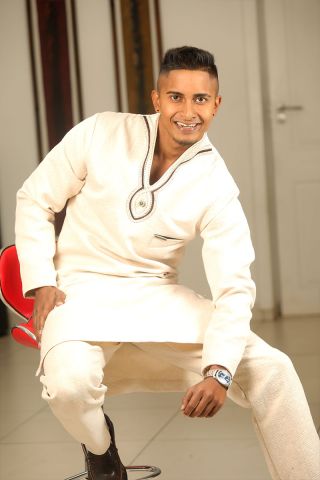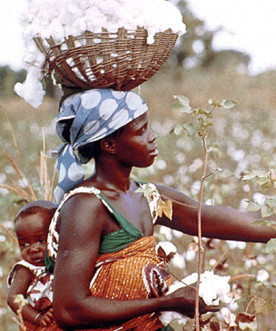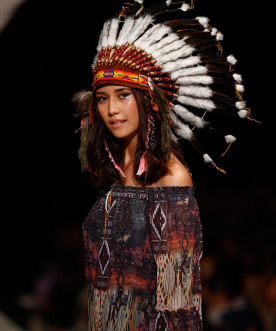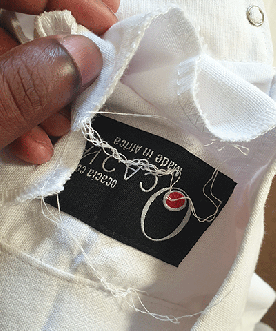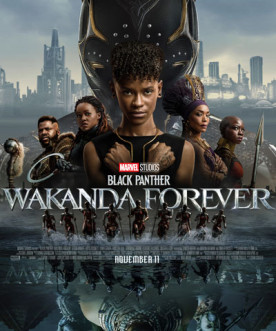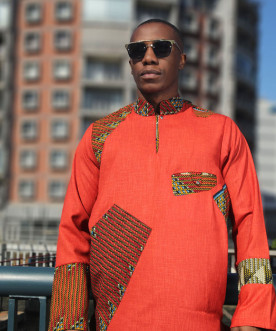Our Journey here
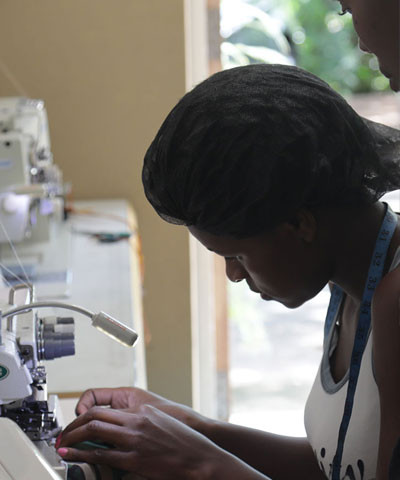
Jun 13 2021
Categories: Ocacia story
“Hide nothing from the masses of our people. Tell no lies. Expose lies whenever they are told. Mask no difficulties, mistakes, or failures. Claim no easy victories...”
―
The story of Ocacia starts with a why. Why did we feel the need to create Ocacia. Because Ocacia was born out of a serious need to represent African culture on a premium level. Our own personal frustration in struggling to buy quality African clothing fuelled the desire to create such a brand. And way before Ocacia was ever created many attempts were made to integrate with other designers to create something to satisfy this need. We even tried to work with the Hebrews in Israel after seeing one of their clothing factories. And once Motherland (2010) was released we realized that we needed to seriously deal with the issue of Made by Africans (made in Africa). And with a lot of support from articles on the African Holocaust site, we made sure we documented our experience for the purpose of guiding people in practical Pan-African solutions. As such, we are very transparent about our challenges per Cabral. So our story is not one of romance or "feel good" it is a story of the hardcore challenges which expose the underbelly of the African condition.
FROM MUSIC TO CLOTHING
It looks nice maybe if you are Stevie Wonder and we need to be brutally honest about this if we want to right what is totally and utterly wrong. Prints designed in China and Europe to fit the most distorted view of Africa--and we accept it. So it is time to restore African fashion so that it represents real clothes that can actually be worn and represent something sophisticated.
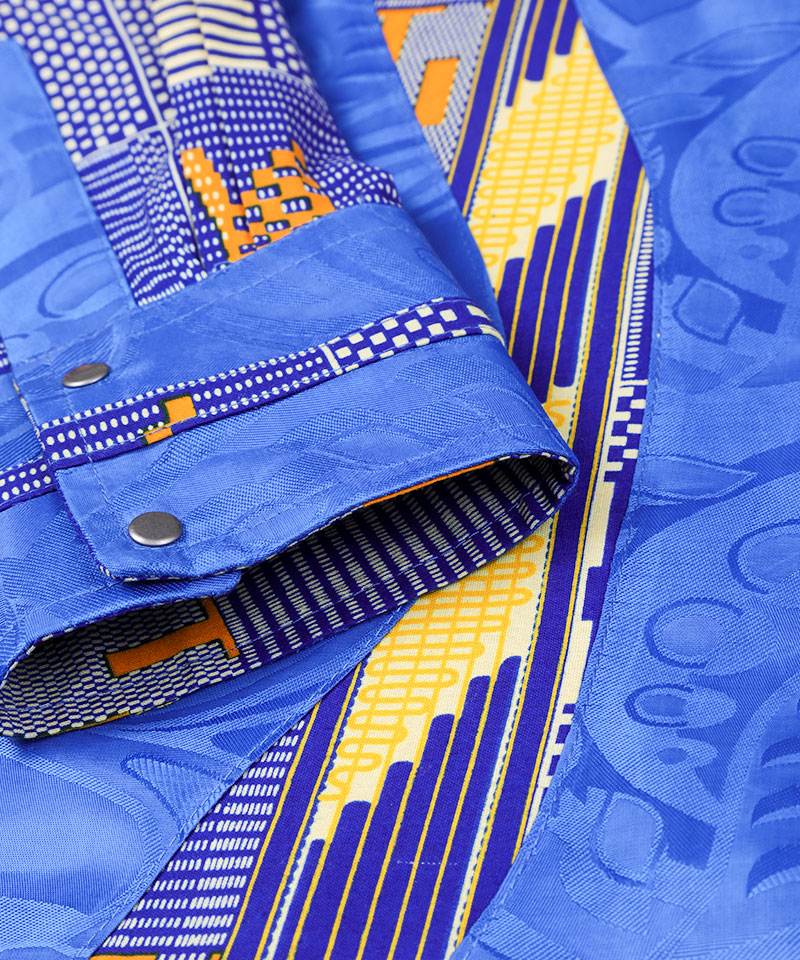
Because African clothes in the mainstream are not "designed" there is nothing going on but throwing anything together. There is no aesthetic unless more is better guiding the process. And we take issue with it the same way we take issue with Nollywood films. But proper African clothes exist and we see them in Ethiopia and with the new designs coming out of Ghana and Nigeria. But most of these designs are generic and seen all over the place. We wanted to create an African designer label, which is something far more nuanced than general nice African clothes that look like what everyone else is doing. So we wanted to avoid "cultural" clothes of Ghana, Ethiopia, and Nigeria and make only Ocacia clothes with an Ocacia aesthetic.
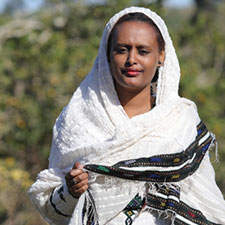
THE REAL MATERIAL WORLD
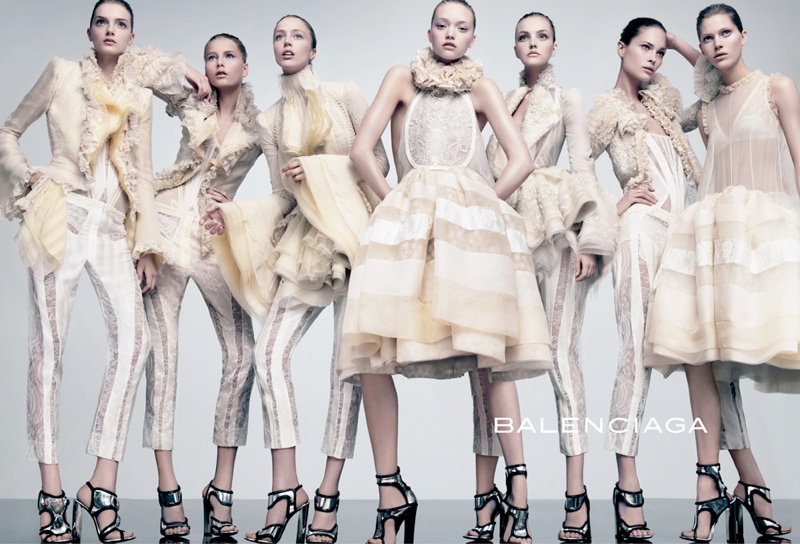
Out of nothing we looked at the world and saw luxury being represented by Chanel, Cartier, Givenchy, Balenciaga, and Oscar. What does it mean? It is European culture projected all around the world as a display of cultural superiority in fashion. (this is an observation). Now, where are our representations? (another observation). We cannot find much (a problem). What would be the solution to this problem?
A. Do not diss African culture by saying we do not have what they have.
B. Saying High fashion does not mean anything (when it really does).
C. Hope they hire us and included us.
D. Making our own offering?
The best answer comes from an
African-conscious mind that understands the world, understands the power of the material world and understands economics. The mind of a victim would not come to this solution. The mind of someone without confidence would not come to this solution. A person without a clear understanding of their identity would not come to this solution.
Our failure as a group in the global markets is primarily (but not exclusively) because of miseducation, poor ideology, and poor understanding. And it is not by accident either. What helped us understand which path to take was that we understood the work of the likes of Malcolm, Elijah, and Garvey
IT IS ALL IDEOLOGY
Paradigm Shift: By understanding what is not there, you are in a better position to build what should be there. Every generation must build, we cannot keep saying "Our ancestors 2000 years ago" were number one in the world. So we can look at our situation globally, and prepare pretty excuses for why we are where we are, or we can be critical of ourselves understand the challenges and get on with the work that needs to be done. We cannot say "we are as good as Milian and Paris" because we are not. We have not done that work as a continent and people yet. We cannot complain that they are rich and we are poor because globalization does not care about our ancestors' troubles with colonialism and slavery. If it is a race, then we are all running it equally despite our unequal setups.
Every day is a hard graf. It is like chess. You are constantly evolving and adapting to the changing world. And the world is a Darwinian world. When one thing is blocked you move around and plan how you will get to your objectives. You have to change your paradigm. Time is not in days, it is in hours, but moreover in work done. So no point saying "I worked all night" when the output is nill. Also, a victory is not always a 100% victory. Many partial victories are won each day. And just like war, territories are won and lost.
NO SUPPORT
The first and greatest challenge every African-owned business faces is support or lack thereof. While every business on Earth has sales as their number one concern I think it is safe to say that the African market's lack of patronizing is pretty unique. There is a substantial lack of value which explains without any room for doubt our low position economically in this world. It is why our communities are full of businesses by every other group. Malcolm X, and all others have commented on this. You can look around the UK, USA, and South Africa and we are busy buying everything "made in Asia and Europe" but very very reluctant to support our own. We have rappers boasting about how deeply they are invested in Gucci and Versace while our clothing industry is dealing in crumbs. And often people offer excuses about the price of African clothes or the quality of African clothes and this is a loop, because how can you have anything without support? It is like chicken or egg. If no one is paying for the top designs that take top skills to make then how can you have professionals making quality? You have top embroidery artists with 20 years of experience sleeping on the floor in Durban. And we must weigh this against the backdrop of in one mall in South Africa you have two high-end stores catering to the clothing needs of a minority Indian population in an African country. You can count on one hand how many African boutiques exist at any quality level selling African clothes. So despite our rich culture in clothing, we are absent from the economic clothing landscape.
Most Africans in clothing are in the hand-to-mouth industry. And the issue of support is not limited to the general African public relationship with African businesses, it also fully applies to the mentality of African businesses to each other. The concept of supporting each other and working together is as alien as Ripley's Xenomorph. It is just not a mental process at all familiar to the inner workings of the African mind. Beyond the most basic relationships, there is a total failure to form complex working relationships to deal with common challenges. So we are so selfish and greedy that even when faced with extinction we would refuse to unite around common issues.

It is essential that we transform from a state of talking about what needs to be done, and start building the world we talk about so much. The great issue of ownership only needs owners in business--nothing else. The issue is not solved by discussing it any further.
The poor quality and lack of a clear aesthetic were worrying considering African people have such a rich culture in these areas. Yet, it is poorly represented in the global market. And this is why Ocacia was created.
When we started we never even made clothes, we took pics, and managed a website, and ran around South Africa getting products to ship to customers overseas. We first tried to work with a local designer Wantashi and the plan was he would do all the clothes and we would run an online shop by the same name. It did not take long to realize that idea would never work in a million years. A total clash of outlook: modern vs very old skool. We then tried to partner with another shop, but unfortunately, the "mentality" was one of exploiting rather than build, so we realized the only way forward was our own brand, our own designs our own everything. You see this train has left the station and we need to catch up with the rest of the world. Either people get that or they do not. Unfortunately, we are not running a school in African development, we are doing African development. Those who cannot hear or want to take it slow and have contracts with God to live for the 400 years need not contact us.
BORN IGNORANT
Everyone is born poor and ignorant, Sowell said that, and it stuck with us. But because we were born ignorant does not mean we stay ignorant. We started a fashion business from utter ignorance. We did not know what linen was. And our first attempt at purchasing linen meet with exploitation. People took advantage of our ignorance to sell us cheap polyester. It is funny since today stores come to us to check the viability of their future linen purchases from overseas suppliers. It is a far cry from where we started. Sometimes we walk by the store that sold us that poly under the guise of linen and sees the same salesperson sitting there exactly in the same position he was in 6 years ago; shame. Our own brothers and sisters exploited us when all we were trying to do was create African excellence. But that is also the story of Africa and if you are confused about that all you will feel is pain and disappointment.
Our first order came in 1 month after the site went live. We could not believe it. We did not even want to shout about it. So we whispered it to each other "We have an order". We checked PayPal, we check the site, we checked everything to make sure it was a real real order. And it was. But the first few months of Ocacia everything we made was at a total loss. That was the investment needed because by the time we paid for fabric, paid external people to sew the clothes, drive up and down behind said people, paid postage we ended up paying approx $20 dollars per order. We grew out of that when we kept changing the parameters of how we did business and who we did business with.
After our failure working with others, we slowly started getting some machines and making our own clothes (how else can you control quality?). But we never did any embroidery. Once we realized it could never work being dependent on someone else and dealing with clashes with them we simply went out and got an embroidery machine and hired in freelance embroidery artist. We finally upgraded from that nightmare of unreliable people and trained our own people to master embroidery. Same with denim distressing, we use to have to drive 24 km to drop off and collect denim to be washed. That could not work, so we figured out how to do it ourselves.
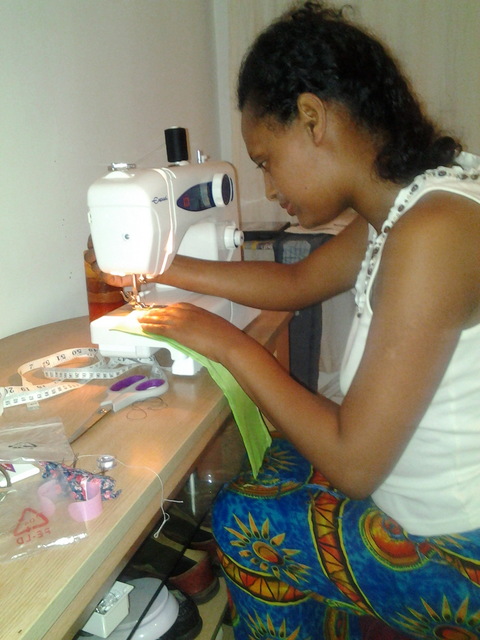
I will never forget the day we bought our first embroidery Zig Zag 20U machine. We had an argument with the guy who ran an embroidery place in the city. He started to complain that our embroidery was more complicated and was taking his guy's time. No problem bro, we thank you deeply because that was the same day we took our jobs from him and went down the road to Thompsons' and ordered our own Zig Zag machine. No one could use it, but one thing we knew for sure was TINA-- there was no alternative.
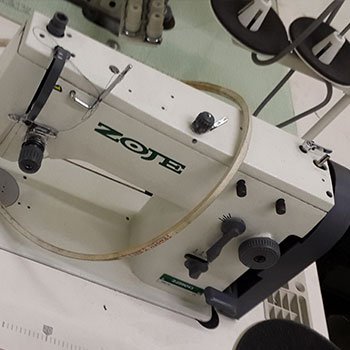
WHAT WE LEARNED
The critical lesson in creating Ocacia was there is no black vs white ideology. Development is only about finding people who share your values and working together. You have to always check yourself because maybe the problem is you. But once you know that you are not the problem there is no time for romance or nostalgia, the job is the job and we are in the business of getting on with it. You work with those who work, never pause to think "it would be so nice to work with so and so" Things work, or they do not work--nothing in-between. You do not pause for one second to reflect on anything else.
And what people who live in the pretty world of rhetoric do not know is in this game we are only interested in the advancement, and advancement comes from anyone and any direction. We do not get to snob the Western world of fashion, we do not get to be 100% uncritical of Asia with the ultra-fast workers. We will go nowhere fast if we live in denial of the greatness of others. Some of us visited Japan and China and were blown away. One person heard this and thought it was disloyal to all things black. LOL. All things black did not help them to put one single shirt on the global market--yet they speak. And that is the problem with this pro-Black mindset. Because there is nowhere in the world of advancement that people (even enemies) do not look at what the other is doing and admit things as they are. During World War II the Brits and Americans admitted the superiority of German U-Boats and Tanks. By admitting it they knew the work they had to do. What would be the point in denying the great work Europe and now Asia has done in fashion. And we know this because we come from a background of cinema, and where do you learn cinema? In Africa or America? So where would we look to make jeans? Zimbabwe, or America? Where did Japan look before they mastered denim? And here we are now being the only African label to commercially make jeans and denim jackets. Because we respected the work others have done and were prepared to start at zero and find our way--our own way!
And on that note, since we were founded if you asked us who has helped us the most it was not our fellow Africans in industry. As mentioned before the concept of working together is alien. Working together is an opportunity to steal and exploit each other. But the person who sincerely helped us the most especially with our denim was Faisal, a Muslim South African Indian. He gave us patterns for free, he gave us business contacts, and introduced us to key players in the denim industry in SA, fabric agents, you name it. He did not ask one thing. Why did he help us? while our own people did not. (worst than not help they actually tried to hold us back). Its that crabs in a barrel mindset you hear people talk about. Faisal's own children had no interest in his business so he says us trying so hard he shared his knowledge with us. Today we still work together, sometimes we do him a favor sometimes he does us a favor. So the very thing he helps us with we can now help him with. This is what Pan-Africanism was supposed to do. Because now we are masters of denim we can help him especially with designs and logistical technological issues. The WE mindset makes us all stronger. Your brother is not your enemy. But most of our people see each other as threats.

PREP IS KING
Ask any welder, the biggest task in welding is prep work. The biggest task when professionally painting your house is prep. And what we do is no different. If you look at making jeans or a denim jacket 70% of the time is spent on prep.
INTOLERANCE WITH LOW QUALITY AND EXCUSES FOR IT
There is Ocacia because we cannot stand low quality. Yet we work with tailors who seem to not understand what Ocacia is about. Now people ask if the tailors are so bad how then do you achieve such high standards? By being like Darth Vader in Empire Strikes back that is how. We have a quality control department that makes their lives a living hell. They either sew straight or go home. Because either we fix up, or give up. Why come in our business and tear down the name we tried so hard to build? People expect Africans to be sub-standard so make a point of proving the world wrong. When you take money from people they worked hard for it, you owe them (on a spiritual level) to do your best. We ask them, would you like to pay $XXX and then see this crap in the post? Then either do it over or it comes out of your wages. To change Africa unfortunately please is not working.
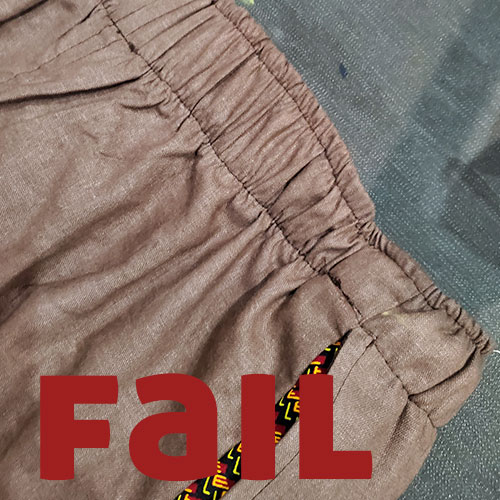
How can you expect to go forward and think the world should give you more when you produce sub-standard? We were all born ignorant of quality but now that we learned it why would we go back? People trust our name they spend 20-30% more on our clothes than those other shops. We have a moral responsibility to only let our best work out of the African door. We might be gone in 2 years or maybe 2 months, and the reason for that will not be because of poor quality.
SWIM OR SINK
I think if you are one of those people who look at tasks as a negative and only like the smooth road then do not even attempt anything in this world. Stay in that 9-5 grind. B/c we are faced with some challenges that you either keep swimming or go down and be shark bait. You see when you try anything off the beaten track (like we do) not only are there risks, there is also no road map. It is not like working in a normal office where you just show up and do what the boss tells you to do and then go home. Every decision you make is taking you into unchartered water with new hidden dangers and challenges. Every day we have to ask ourselves how do we get to the next day, and what impact will our decisions today have on our future tomorrow. And the only option available is to win! There is no turning back. No retreat. Win or die trying.
MINDSET
During Covid it did not take 2 days to realize we better start making masks. When we told a friend of ours his kneejerk remark was to say "we were so capitalist". This is the black mindset created by being enslaved. Because had we said we were going to import masks from China--he would not have seen anything wrong with that. But for Africans to use their skills to make their own personal protection is a form of capitalism (where capitalism is clearly for everyone to use against us, yet we are not allowed to use it for our own development). The next thing BBC ran a story about how "smart" Africans were because they said we were turning the COVID thing into an opportunity for fashion. Now, it seems like a form of flattery but it is not. Ask yourself could you run that story about Japan, or China, or Israel? It would be insulting. But people praise the obvious because they expect nothing from us. They might as well print "Africans plant their own food."
SHIPPING
When you want cheap rates and a big account with people like FedEx and DHL you need to be bringing them big revenue every week. It is why a lot of our people cannot do big business because we cannot secure the support to allow them to get these deals with the titans of this business world. Now, what happens to a business trading internationally without a courier account? Simple, you not in business. And a lot of beautiful ideas die because who will give someone with nothing (no bank account, no documentation, no tax certificate) an account? Our parent company has always done business with courier companies in the UK. But here in South Africa, the offerings are far thinner. We started with FedEx, the big bad titans of the courier game, and offered the service only for people who wanted fast courier services. Aramex came along and seduced us away from FedEx with their sweet rates, and for the first time, we could offer courier shipping on every single thing that left our factory. Then Aramex started doing some creative billing, charging us for volume and not weight. Not a problem but they did not do so accurately. So a parcel with two jeans got charged the exact same as a parcel with 4 jeans and 3 shirts. This lead to issues with the accounts department for overbilling. When COVID hit months went by under lockdown and the account struggled. They promised to help businesses get back on their feet instead they coldly lied to us and made false promises of supporting us during COVID. We left that relationship behind and now are with DHL after a brief stint with Dawn Wing (one of the worst courier companies on Earth). Dawn Wing is who you use when you are desperate. Because the post office is not a viable option for a serious business handling premium clothes.
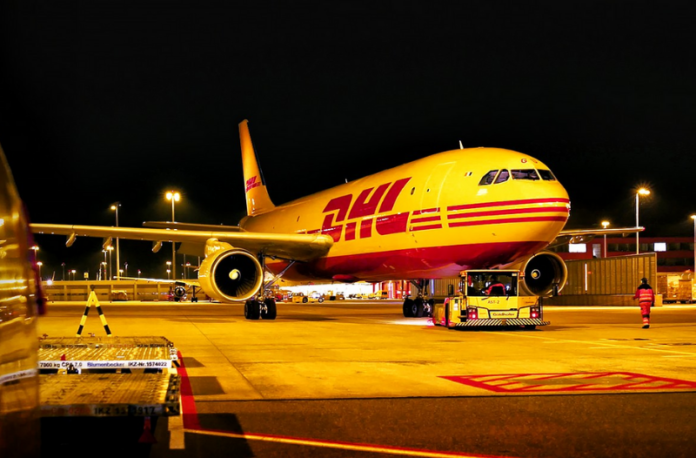
OCACIA 1.0 to OCACIA 3.0
We come from a tech background, our parent company Halaqah has been doing media and IT for 23 years (1998) and that goes a very long way to explain why our sites and our media is top-notch. Because that is what we were doing way before we decided to branch off and get into fashion. We are 100% a multi-media company from day dot. Unfortunately, our Magento 1.9 site started to break down, but we loved it so much. Our first site was pretty poor by comparison. But our Ocacia 2.0 Magento site was amazing. But due to it being no longer supported by PayPal, Magento, the servers etc we had to make the jump. And that jump came at a time when the funds to be doing these big moves was really not there. But what can you do? You have to move, you have to move. So we said if we are going to create a brand new site from zero, we better go big or go home. And you know we not going home. Tech today is different from tech back when we started. There is a lot more specialists with tech companies bringing in the necessary skills when they are needed. We are no different so we hired some coders. But we want to keep Africans employed so we hired a team from Nigeria who did a lot of the big moving of data. The first part went well, the second part was horrendous. And we all know how that story goes. It is not that people from Europe and Asia will not drop the ball and spoil the show--because they will. But why oh why do our people have to always disappoint and prove why we should avoid each other? These guys made so many excuses for the skills they did not have. Finally, in brotherhood fashion, we agreed to part company. It is interesting when we hired someone in India they were able to do all the things the Nigerian team just said were not possible. And here is the problem with the African mindset--while we valued our people enough to give them the contract over say Indians and Eastern Europeans, they did not value us! And the beautify of the project. We might have been Pan-African, but they really did not give a damn. It does take two hands to clap.
The new site had issue after issue and went from 2 weeks to 2 months. But fingers crossed the worst is behind us as this blog is being written on our brand new site. For more info on our new site click our Brand New site story.
TRANSPARENT
Businesses operate with a public face and then they have a private face. We think that our clients are mature enough so we like to be transparent with them about how we operate and why things are the way they are. What we are trying to achieve as an African-conscious business is so much more than money in our pockets. We want the good that we have learned to become New African standards. And we want the errors we have made in our journey to be known so our people can avoid them. One thing we understand is that when this thing kicks off and business and quality become the standard the closer to victory for the African nation. But how can we get there when we have no examples? Who is the example for Ocacia to follow? So we have to design our own bridge while walking across it.
SURVIVALIST MENTALITY
One thing we did right and different at Ocacia is unlike everyone else we did not go and rent a factory in some industrial district. No, that is hardly progressive. We put the entire Ocacia set up in a compound in the suburbs that we own. We have enough land to expand in the future (if there is a future LOL). And on this compound, we do what we wanna do. We have apartments for living, we have kitchen, living room, we even have a DTS surround sound system installed for relaxing. A dining area, a garden with some food crops. The only thing shocking is why haven't more people done so. Because it is the new trend in South Africa since lockdown. But this is the only trend we do. Maybe it is something we learned from UK living. But now that the country is messed up we can continue working. Food, like fabric, is kept in storage giving us supplies to survive for a little while, while things return to normal. After this last incident, we will be developing an even stronger bunker mentality and growing more veg and storing more fuel.
THE MARKET
People in business target different markets, and every market has different rules. Makes no difference doing expensive videos and photos for a market that has no value for it. Or for products that do not merit it. Might as well use your iPhone. So when you see these street vendors in the Gambia selling their things, everything they are doing is correct for their market. There is an artist we know who was doing big-budget shoots and then he ran out of money and started doing low-budget shoots. The truth is it made no difference as his entire platform was cheap. It makes no difference if he pays $200 for a video or $200,000 because he targets the same 100 people who do not care either way. If you are selling to people on Facebook why would you need a complex merchant account? Why would you need an online site when everyone ask the price in the comments and no one has data to go beyond social media? Online shops are no good when the people you are selling to do not even have bank accounts? When you start your business selling on the street the products match the street. Tag Heuer does not sell watches on the street. Because that is not their market. The products and the market must align.

